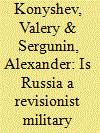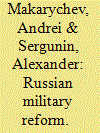|
|
|
Sort Order |
|
|
|
Items / Page
|
|
|
|
|
|
|
| Srl | Item |
| 1 |
ID:
136072


|
|
|
|
|
| Summary/Abstract |
In contrast with a widespread perception of Russia as an expansionist power in the Arctic, this article argues that Moscow does not seek military superiority in the region. Rather, Moscow's military strategies in the Arctic pursue three major goals: first, to demonstrate and ascertain Russia's sovereignty over its exclusive economic zone and continental shelf in the region; second, to protect its economic interests in the High North; and third, to demonstrate that Russia retains its great power status and still has world-class military capabilities. The Russian military modernization programs are quite modest and aim at upgrading the Russian armed forces in the High North rather than providing them with additional offensive capabilities or provoking a regional arms race. The Russian ambitions in the Arctic may be high, but they are not necessarily implying the intentions and proper capabilities to confront other regional players by military means. On the contrary, Moscow opts for soft rather than hard power strategy in the Arctic.
|
|
|
|
|
|
|
|
|
|
|
|
|
|
|
|
| 2 |
ID:
136733


|
|
|
|
|
| Summary/Abstract |
In contrast with a widespread perception of Russia as an expansionist power in the Arctic, this article argues that Moscow does not seek military superiority in the region. Rather, Moscow's military strategies in the Arctic pursue three major goals: first, to demonstrate and ascertain Russia's sovereignty over its exclusive economic zone and continental shelf in the region; second, to protect its economic interests in the High North; and third, to demonstrate that Russia retains its great power status and still has world-class military capabilities. The Russian military modernization programs are quite modest and aim at upgrading the Russian armed forces in the High North rather than providing them with additional offensive capabilities or provoking a regional arms race. The Russian ambitions in the Arctic may be high, but they are not necessarily implying the intentions and proper capabilities to confront other regional players by military means. On the contrary, Moscow opts for soft rather than hard power strategy in the Arctic.
|
|
|
|
|
|
|
|
|
|
|
|
|
|
|
|
| 3 |
ID:
124528


|
|
|
|
|
| Publication |
2013.
|
| Summary/Abstract |
This critical comment examines the incentives, major priorities, difficulties and first results of the Russian military reform that is being implemented since 2008. The authors conclude that despite numerous drawbacks and barriers to the reformist efforts certain successes can be identified. Particularly, there is a clear shift from the old-fashioned, Soviet-type army to a more compact, mobile, better equipped and combat-ready armed forces that are capable to cope with today's challenges to Russian national security.
|
|
|
|
|
|
|
|
|
|
|
|
|
|
|
|
| 4 |
ID:
153338


|
|
|
|
|
| Summary/Abstract |
This paper examines the nature of Moscow’s military strategies in the Arctic. It is argued that the roles of military power have radically changed since the Cold War era. According to Russian strategic thinking, instead of being a coercive instrument in a global confrontation between two superpowers and capitalist and socialist systems, now military power has new functions, such as to ascertain Russia's sovereignty over its (not their) exclusive economic zone and continental shelf in the region, protect Moscow’s economic interests in the North, prevent illegal migration and potential terrorist attacks against critical industrial and infrastructural objects, fulfil some dual-use functions (such as search and rescue operations, monitoring air and maritime spaces, providing navigation safety, mitigating natural and man-made catastrophes), help academic community in developing Arctic research, and carry some symbolic functions. These new roles, however, do not preclude military power from fulfilling its traditional functions, such as territorial defence, power projection, deterrence, and containment. Russia’s military modernisation programmes are described. The authors arrive at a conclusion that these programmes do not provoke an arms race or undermine the regional cooperation. To prevent negative security trends, a system of arms control and confidence- and security-building measures should be developed in the region.
|
|
|
|
|
|
|
|
|
|
|
|
|
|
|
|
|
|
|
|
|